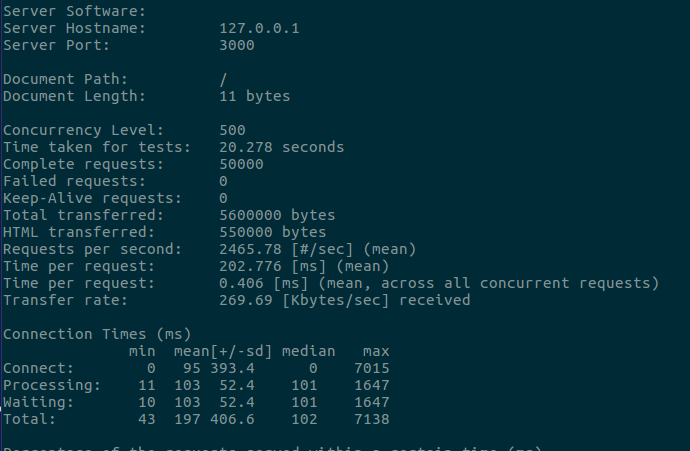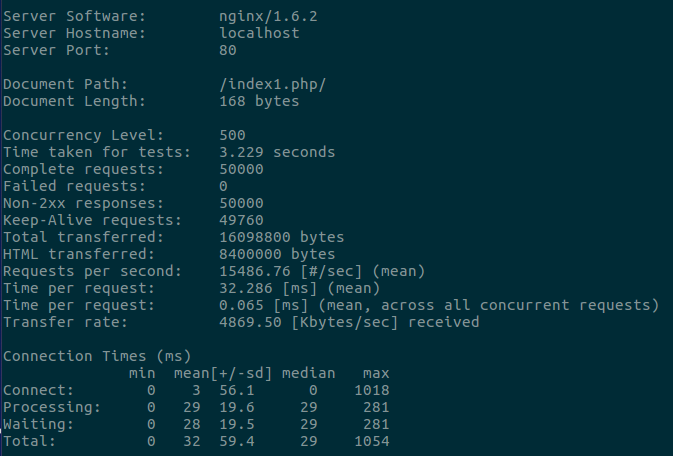
07
November 2018
PHP vs NodeJS Comparison and Benchmark
Almost every day there are some new technologies emerging, that are trying to change the web landscape. We will compare two back-end technologies PHP vs NodeJS.
First of all, let’s define PHP and Node.js. PHP is a server-side scripting language. It was created in 1994 by Rasmus Lerdorf, primarily for web development. Originally PHP stood for Personal Home Page, but now it stands for a recursive acronym – PHP: Hypertext Preprocessor.
Usually, PHP is processed by an interpreter, powered by the Zend Engine, that is installed on web servers such as Apache and Nginx. Also PHP code can be embedded into HTML or HTML5 markup. This flexibility contributed to the popularity of the language, PHP is now used on more than 80% of web servers.
Node.js is an open-source, JavaScript run-time environment used to execute JavaScript code on the server-side. Node.js development process has changed the paradigm that JavaScript is used primarily on the client-side. That’s why Node.js has become one of the foundational elements of the “JavaScript everywhere” paradigm. Node.js was created by Ryan Dahl in 2009.
It is powered by Google’s V8 JS engine, that is the same engine that is used in Google Chrome web browser. This JS runtime environment doesn’t need a separate web server or other dependencies, there are built-in libraries that take care of that. Compared to PHP, Node.js is relatively young, however, it is already well recognized and used by giant companies like Microsoft, Yahoo, LinkedIn, and PayPal.
Benefits of PHP
Some developers say that PHP is much easier to use then Node.js. Their arguments are:
- It’s easier to configure the development environment for PHP.
- Node.js requires more code.
- In order to code on Node.js, you have to understand callback functions and blockings.
- All internet hosting services support PHP.
- Supports more frameworks and CMS.
- Official code organization recommendations (PSR).
- PHP has a larger library of instructions and frequently asked questions.
- The PHP developers community is a massive and diverse group of people, they are constantly re-visioning and updating libraries, frameworks and other PHP components.
You should consider using PHP when your project includes:
- CMS technologies such as WordPress, Drupal, Joomla etc., even if there is only a part of your project includes these technologies (for example blog, admin page, online store etc.)
- If you are using a relational database – go with PHP.
To sum up the whole server side of this PHP vs NodeJS comparison, PHP supports following database management systems:
|
|
Benefits of Node.JS
One of the main advantages of Node.js is the support of multithreading. While it is a necessity in browsers, it is not that much needed in web development process. A lot of developers choose Node.js over PHP. Here’s why:
- Built-in server support.
- A single syntax for client and server side of the website. This improves the reusability of the code and makes the work of a full stack developer easier.
- Module caching – modules are downloaded and initialized when they are called for the first time, afterward they are constantly available.
- Stream module makes it easier to work with large files.
- Node has an almost identical syntax to JavaScript, thus it easy to pick-up and learn for JS developers.
Chrome V8 engine
As it was stated before, Node.js is powered by Chrome V8 engine. This engine is the source of many other benefits. You should consider using Node.js when your project includes:
- Streaming data transfer – traditional web stacks usually convert queries and corresponding HTTP to elementary events. However, they are data streams, and Node.js apps can take advantage of that. A great example of this kind of data stream is file processing during the download or data transfer between different layers.
- NodeJS supports real - time Web development – this allows to develop chats, betting apps, apps like Twitter, or interfaces for instant messaging with ease. But you have to be careful with that. Because the response time can vary, if the garbage collector interferes, he stops the execution of the program.
- Software packages that include NodeJS, for example, MEAN (mongoDB, Express.js, Angular.js, Node.js).
- Built-in expansion capabilities (cluster package).
Here is the PHP vs Node.js comparison table of supported technologies:
| PHP | Node JS | |
| CMS | Magento, WordPress, Opencart, Drupal, Joomla, PrestaShop | Apostrophe2, Ghost, KeystoneJS, enduro.js, Pencilblue |
| MVC frameworks | Symfony, Laravel, Yii, Codeigniter, Zend, Phalcon, CackePHP | Koa JS, Express JS, Sails JS |
| Realtime | Ratchet, Wrench, Elephant.io, Socket.io | ws, Sockjs, Socket.io |
| REST API | RestClient, Guzzle, HTTPFUL | Restify, Loopback |
| Scaffolding | symfony+, laravel+ , yii+, CackePHP | Yeoman |
| HTML templating | Twig Blade Latter Smarty Volt Mustache |
Jade Underscore EJS Handlebars Mustache Embedded js |
| Horizontal scaling implementation | Elastic beanstalk, varnish | Cluster mode, Amazon Elastic Beanstalk |
| Load balancer support | + | + |
| Queues | + | + |
| Multiple drivers support DB, storage | + | + |
| Full-text search | + | + |
| Profiling | Xdebug, Blackfire, XHProf, XHGui | Built in profiler |
| Caching | Redis, Memcache | Redis, Memcache |
| CI support | Travis CI, Codeship | Travis CI, Codeship |
| QA | PHPUnit Cucumber (behat) Atoum Selenium Dusk Kahlan Php_testability Codeception |
Phantom.js Jasmine Protractor Nightwatch.js Casper.js Nemo.js Buster.js Selenium |
Benchmark
It is a good idea to choose a winner in PHP vs Node.js based on the features and benefits. However, it is always better to see how they are performing back to back, PHP vs NodeJS. We have created two different test cases and will run them on the same machine.
The test bench configuration:
|
|
PHP vs NodeJS – First test
This test will show us how well PHP and Node.js are working with arrays, string concatenation, network I/O, and arithmetics.
Results for PHP:

Results for Node JS:

As you can see PHP is faster than Node.js in:
- Concatenation of strings.
- Filling array.
- Filling associative array.
- Reading the file.
- MySQL query.
Node.js is faster than PHP only in adding numbers.
PHP vs NodeJS – Second test
Now, we will test out how well Node.js and PHP are handling multi threaded tasks. We will throw at them 1000 queries in 1000 threads. All configuration was done on the server side. Nginx 11.7 + PHP 7.1.1 FPM vs Node.js.
Results for Node.js:

Results for PHP:

The second test has ended and the results are in favor of PHP, again. The numbers are:
- PHP + Nginx – 32 ms.
- NodeJS – 200 ms.
To put this numbers into a somewhat more acceptable form, PHP is capable to process 31,250 queries per second, Node.js, on the other hand, can deal with 5,000 queries per second.
Conclusion
- PHP has won in almost every category of our PHP vs Node.js comparison.
- PHP is more popular and easier to learn, yet it supports a significant amount of professional programming technologies and techniques. There are plenty of sources where you can get assistance and help and the deployment process is so much easier than Node.js.
However, don’t discount Node.js yet. Despite its steep learning curve, it has some really serious advantages.
- With the help of AJAX and HTML5 you can create very efficient apps and once the code is cached, the only thing that keeps transferring is data.
In the end, there is no clear winner of PHP vs Node.js.
When you decide to create a new project, use the data presented in this article to pick what is best suited for your project and you.

